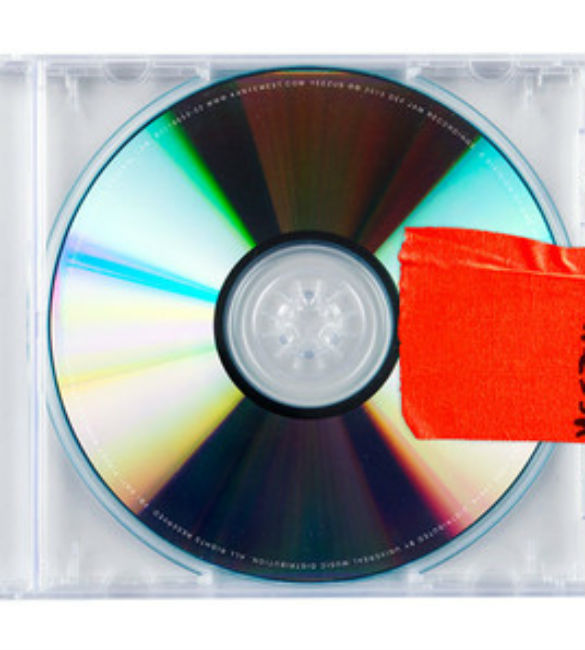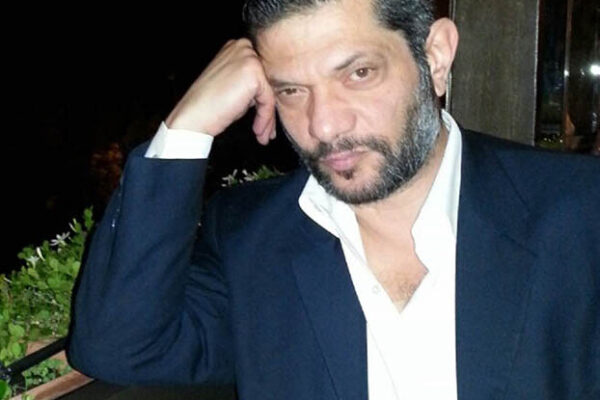Look at the song title “I Am a God” and it seems like easy blasphemy– Kanye West’s update of John Lennon’s “more popular than Jesus” shocker from 1966. But just as the Beatle’s proclamation was fuller and wiser in context– “I believe that what people call God is something in all of us,” Lennon would later explain– “I Am a God” is not simply the latest self-important blast from one of pop culture’s pre-eminent egoists. For starters, the track sounds less triumphant than breathtakingly vexed, crashing in with a gnarled dancehall vocal sample and paranoid sawtooth synths that aim to destroy. Here, Kanye raps about loyalty, respect, threesomes, and, yes, croissants with the urgency of someone being chased by a 30-ton steamroller. The song is pierced by a series of primal screams, pixelated outbursts that are only briefly able to halt the beat’s heaving evil. In Kanye’s hands, being a god sounds stressful as hell, something we can all relate to, and the song’s apparent inspiration is a passage from the book of Psalms: “I have said, Ye are gods; and all of you are children of the most High.”
These are the immeasurably lofty stakes Kanye deals in on Yeezus, his sixth solo album. His intensity here has a heightened desperation as he howls into the void, but the Chicago native has always been beguiled by the view from above. Take “Jesus Walks”, where he references another Psalm while gasping from on high: “I walk through the valley of the Chi where death is/ Top floor, the view alone will leave you breathless.” Then, on “POWER”, he contemplates leaping out of the penthouse, “letting everything go.” In a way, Yeezus is the panicked sound of that ensuing free-fall, a rush of angst and despair with absolutely nothing left to lose.
The album is something of a razor-sharpened take on 2008’s distressed 808s & Heartbreak and marks a blunt break with the filigreed maximalism Kanye so thoroughly nailed on My Beautiful Dark Twisted Fantasy. In hindsight, the latter record– with its ingratiating GOOD Fridays buildup, endless guest list, and uncharacteristically apologetic interview sessions– was his attempt at recapturing a superstar-sized American audience after a slew of entertaining-yet-questionable PR incidents. Except it didn’t exactly work: While Twisted Fantasy was universally lauded and went platinum, it still stands as Kanye’s worst-selling album to date, failing to produce a top 10 single. But even if it wasn’t a chart smash, the intricacy and durability of Twisted Fantasy incubated the Cult of Kanye to an extreme level. “I’d rather piss a bunch of people off and make myself happy than make everyone else happy and be pissed off inside,” he told VIBE around the release of 808s. Yeezus doubles-down on this exclusionary philosophy: “Soon as they like you, make ’em unlike you/ ‘Cause kissing people ass is so unlike you.”
For Kanye, there’s purpose in repulsion. And on Yeezus, he trades out smooth soul and anthemic choruses for jarring electro, acid house, and industrial grind while delivering some of his most lewd and heart-crushing tales yet. This is willful provocation that Ice Cube, Madonna, and Trent Reznor could all be proud of. Some of the record has him tackling the same issues he’s been rapping about since The College Dropout, albeit with a fire-eyed stare. On his debut’s “Family Business”, he poignantly lamented a jailed cousin’s absence at the Thanksgiving dinner table in a manner “so sweet, like a photo of your granny’s picture.” On Yeezus, he’s still addressing the plight of incarcerated black men, but now he’s incensed. With “New Slaves”, he confronts us with vulgar stereotypes while exposing the prison-industrial complex for the deeply systemic racist sham that it is.
Meanwhile, XXX creeper “I’m In It” sounds like a dancehall orgasm mired in quicksand and makes previous come-ons like “Slow Jamz” come off like Disney theme songs. “The kids and the wife life, but can’t wake up from the nightlife,” says the new father on that track’s knowingly button-pushing final verse. “I’m so scared of my demons/ I go to sleep with a nightlight.” Kanye told The New York Times he’s recently reached a new level of Zen, but this is the opposite of beach-chair music. Perhaps the album’s most explicit lines are the blurry fantasies of a confessed porn addict who’s described his daughter’s mother as a “superstar all from a home movie.” Without much room for levity, Kanye’s complicated and distrustful view of women is unrelenting on Yeezus. And while there’s no real excuse for flat oafishness like “eatin’ Asian pussy, all I need was sweet and sour sauce,” many of the album’s most powerful moments have him broken down, insecure, and bloody, railing against an ineptitude with the opposite sex.
Album pinnacle “Blood on the Leaves” tells a nightmarish story of divorce and betrayal, all while samples of Nina Simone’s pitched-up “Strange Fruit” and TNGHT’s demonic “R U Ready” horns play yin and yang to the protagonist’s alternately sorrowful and furious headspace. “Hold My Liquor” and “Guilt Trip”, meanwhile, find Kanye trying to restate his manhood while his emotions crumble around him; if he’s not drunk and swerve-y, trying vainly to reconcile with an ex, he’s hoping to brag himself out of being dumped. Caustic humor shows up now and then, buoying certain lines or tracks like “Send It Up” and “Bound 2”, but it’s often fleeting. As on “Runaway”, there’s something palpably sad about the men in these songs, which twists them away from misogynistic assertions of power toward feelings that are ultimately more self-destructive. As contemporaries like Jay-Z, Beyoncé, and Justin Timberlake increasingly devote their music to largely winning tales of contentment, Kanye is unwilling or unable to settle for settling down.
This discomfort is essential to his enduring appeal. For instance, instead of working with giant phone companies to guarantee commercial success, a la his big brother, Kanye’s now making a point out of rejecting corporate sponsorship. Whether it’s a meaningful stance or a blindly contrarian move is up for debate. But after recent tensions between hip-hop and corporate America, visceral and disturbing lines like “put my fist in her like a civil rights sign” put Kanye beyond the reach of mainstream brands hoping to siphon his credibility. As he told the Times, he’s not disinterested in the idea of big companies or big money– he compared himself to Steve Jobs, after all– but he wants control.
The restlessness spreads to his aesthetic and collaborative choices. Rather than relying on known hitmakers to augment his music, Kanye solicited ideas from exciting up-and-comers including Hudson Mohawke, Young Chop, and Arca. And even veteran producers involved in the project, like Rick Rubin and Daft Punk, were seemingly chosen not for their name recognition but their history of rule-breaking. In the mid-1980s, Rubin veered away from the colorful, party-starting tones of early rap music and created bare, hard beats for LL Cool J, Run-D.M.C., and the Beastie Boys– a perfect fit for Yeezus’ less-is-more snarl. And though Kanye’s blaring, digitized assault couldn’t be further from Daft Punk’s naturalistic, groove-based Random Access Memories, the artists share a basic philosophy. As Daft Punk’s Thomas Bangalter recently said of their new record: “We had the luxury to do things that so many people cannot do, but it doesn’t mean that with luxury comes comfort.”
The idea extends to the how Yeezus treats the human voice. Running with the confounding hook from last year’s “Mercy”, dancehall patois is scattered throughout, bringing with it that music’s sense of menacing confrontation. And Bon Iver’s Justin Vernon shows up on a few tracks, using his voice to give the darkness an angelic tint. Expanding upon the cracked vocal experimentation on Twisted Fantasy’s “Blame Game”, Kanye’s own voice is often shadowed by pitched-down ghouls. And though he could’ve likely chosen any rapper on earth to guest on the riotous “Send It Up”– probably the most likely, if not only, chance Yeezus has for a rap-radio hit– he chose Chicago’s relatively unknown King L. His presence, along with that of fellow Chi-town driller Chief Keef, makes the message clear: America may want to ignore these young black men from the gang-strewn South Side, but here, they have a voice.
All of these unlikely choices demonstrate how cohesion and bold intent are at a premium on Yeezus, perhaps more than any other Kanye album. Each fluorescent strike of noise, incongruous tempo flip, and warped vocal is bolted into its right place across the record’s fast 40 minutes. The precise approach runs through Yeezus’ guerrilla-style promotion, too, which found an army of dark vans lighting projections onto buildings around the world, itself a boots-on-the-ground reaction to today’s InstaTweet brand of music dissemination. I went to one of these impromptu happenings last Saturday night, in the middle of Manhattan. At 1:20 a.m., the words “NOT FOR SALE” lit up on the south side of the Louis Vuitton building. A few guys ran across the street with Christmas-morning glee, snapping photos. Then, Kanye’s starkly-lit visage appeared to recite “New Slaves”‘s anti-consumerist lines as cabs streaked by the luxury stores below. His was the only black face to be seen across the jumbo ads lining an eerily desolate 5th Ave. The van soon closed its doors and drove away; the culture bomb’s flash was over in an instant, but the reverberations were just starting to spread.




